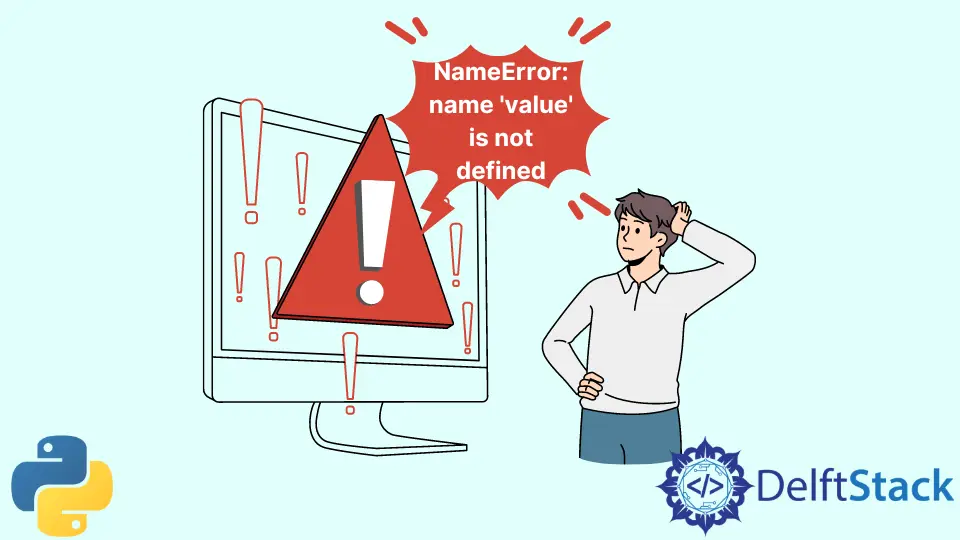How to Handle NameError Exception in Python

This tutorial will discuss how the NameError exception occurs and how to handle it in Python.
the NameError Exception in Python
The NameError exception in Python is raised when the object called is not initialized in the current scope. It may be defined, but we aren’t using the right name to call it.
There are four distinct reasons for this exception, discussed in detail below.
Misspelled Built-In Function or Keyword
When using the built-in function or keyword, we often misspell it, or the IDE sometimes forgets to correct us. The NameError exception is raised in this case. To handle this exception, we have to specify the correct name of the function or the keyword being used.
The code snippet below demonstrates a scenario where a built-in function is misspelled while calling, which raises the NameError exception.
prnt("Hello World")
Output:
---------------------------------------------------------------------------
NameError Traceback (most recent call last)
<ipython-input-1-bcdc0d5019dd> in <module>()
----> 1 prnt("Hello World")
NameError: name 'prnt' is not defined
We misspelled the built-in print() function to raise NameError exception. The only way to fix this exception is to look up the official documentation of Python for the correct function definition.
Used Undefined Variable or Function
This is another popular cause for raising the NameError exception. We tend to call a function or a variable that doesn’t exist.
This code snippet demonstrates a scenario where a built-in function is misspelled while calling, which raises the NameError exception.
print(value)
Output:
---------------------------------------------------------------------------
NameError Traceback (most recent call last)
<ipython-input-2-a458d288e6eb> in <module>()
----> 1 print(value)
NameError: name 'value' is not defined
We called the undefined value attribute to raise the NameError exception. The only way to fix this exception is to remove the function or variable call from the code.
Called Local Variable or Function in Global Scope
We sometimes call local functions and variables outside their scope, resulting in the NameError exception.
The following code s demonstrates a scenario where a local variable is being called in the global scope, which raises the NameError exception.
def func():
value = 6500
print(value)
Output:
---------------------------------------------------------------------------
NameError Traceback (most recent call last)
<ipython-input-5-9e4aa38076bc> in <module>()
1 def func():
2 value = 6500
----> 3 print(value)
NameError: name 'value' is not defined
The local variable value resides inside the func() function, but we called it in the global scope, which raises the NameError exception. We can fix this exception by understanding where we can use each variable and function to refer.
Called a Variable or Function Before Declaration
This type of error happens quite often when we call a variable or function before its declaration. Python is an interpreted language, which gets executed line-by-line in a sequence.
The following code demonstrates a variable call before the declaration, raising the NameError exception.
print(value)
value = 1500
Output:
---------------------------------------------------------------------------
NameError Traceback (most recent call last)
<ipython-input-6-49e5676ec0d7> in <module>()
----> 1 print(value)
2 value = 1500
NameError: name 'value' is not defined
Before its declaration, we called the value variable to raise the NameError exception. We can fix this exception by writing the calling statement after the initialization.
Handle the NameError Exception in Python
If we want to handle the NameError exception so that our code never stops execution, we can enclose our code inside the try/except block. We can use the NameError exception class to handle this exception type.
The example code snippet demonstrates how to handle the NameError exception without stopping the execution with Python’s try/except block.
try:
print(v)
v = 1500
except NameError:
print("Nameerror exception raised")
Output:
Nameerror exception raised
We handled the NameError exception by enclosing the error-prone code inside the try block and writing the error message in the output with the except block. This method doesn’t solve our problem or remove the exception.
An advantage of this method is that our code never stops its execution.
Maisam is a highly skilled and motivated Data Scientist. He has over 4 years of experience with Python programming language. He loves solving complex problems and sharing his results on the internet.
LinkedIn